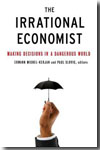The irrational economist
making decisions in a dangerous world
- ISBN: 9781586487805
- Editorial: PublicAffairs
- Fecha de la edición: 2010
- Lugar de la edición: New York. Estados Unidos de Norteamérica
- Encuadernación: Cartoné
- Medidas: 23 cm
- Nº Pág.: 315
- Idiomas: Inglés

The world's most distinguished behavioral economists address the economic implications of catastrophe - how we must reconcile our instincts with a world full of natural disasters, global climate upheaval, financial storms and terrorist threats. We live in a risky world, one that requires us sometimes to make complicated, life-changing decisions often very quickly. The science of decision-making and adapting to changed circumstances is multi-disciplinary, but no area is more concerned with the rightness of how humans spend their resources and make their minds up than behavioral economics, the newly fashionable part of the economics curriculum. Here, leading thinkers and academics in this field, including three Nobel Prize winners, begin to show how we must reconcile our instincts with a world full of natural disasters, global climate upheaval, financial storms and terrorist threats. Of the 20 most costly insured catastrophes that occurred in the world in the past 38 years (1970-2007), half of them (ten events) have occurred since 2001, nine of them in the United States. For the US, which has extensive experience with natural catastrophes, the 2004 and 2005 hurricane seasons demonstrated the lack of adequate loss reduction measures and emergency preparedness capacity required to deal with large-scale natural disasters. Hurricane Katrina alone killed 1,300 people and forced 1.5 million people to evacuate the affected area - a historical record for the country. Economic damages are estimated in the range of US$150 to 200 billion. The 9/11 attacks and the 2004/2005 series of hurricanes that made the US landfall demonstrate a new scale of destruction. What is at stake here is the fundamental question of the affordability of living with risk, and the appropriate role of the public and private sectors in providing adequate coverage to the potential victims of future disasters. Contributors to the "Irrational Economist Initiative" are






